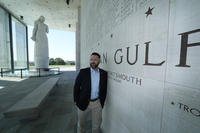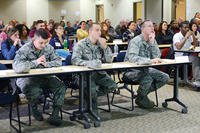"Mr. Thompson! What does this book have to do with you being in the Army?" asked a curious Suzanne.
I had prepared a special lesson for my tenth grade world history class around Veterans Day; students were assigned several artifacts to analyze from my years of service with the 82nd Airborne Division. Suzanne noticed other groups handling more enticing objects like my helmet, which had once protected me on parachute jumps and dismounted patrols.
"I want to see the helmet, not this book," demanded Suzanne.
She was about to put the book down, initial curiosity having given way to clear disappointment, when I provided some needed redirection.
"Remember, Suzanne, that a historian is like a detective. There's always more to investigate; don't give up," I urged.
Suzanne still visibly frustrated, opened the paperback edition of Frank McCourt's Teacher Man, which details the author's experiences as a high school teacher at several New York City schools. McCourt, who is known for his Pulitzer Prize winning Angela's Ashes, would have understood my challenge with engaging Suzanne in the lesson.
The book was among many items—AA batteries, beef jerky, headlamps, candy, magazines, powdered drinks, socks—my mom carefully packed up in hundreds of boxes. She would make weekly trips to her local post office in Tucson, Arizona, for 13 consecutive months, fill out a customs form, hand over the package to a supportive postal employee, and it would always find its way to my small outpost in the rugged mountains of Afghanistan.
Suzanne's curiosity returned as she opened the book and looked at the inside cover. She read my mother's inscription to me out loud, "You would make a terrific teacher — just like Mr. McCourt — especially with that sarcastic sense of humor."
Suzanne smiled and looked up at me and without any hesitation asked question after question about my mom, the book, and my time in the military. Suzanne was now acting like a good detective, and with her interrogation nearing its end, asked one final question.
"Did you become a teacher because of this book?"
It was an excellent and timely question.
Over the next several years, the number of service members transitioning from military to civilian life is expected to increase significantly. A growing number of these veterans will be enrolling at colleges and universities as they seek to become career-ready and improve their future prospects for employment.
I know firsthand about this transition. While deployed, I often thought about my life after the Army, and I wanted to do something where I could still continue to serve my country. After reading Teacher Man, I realized the best way to do just that was to go back to school, so I could one day stand in front of a classroom as a teacher.
I encourage my fellow veterans to consider teaching as your next career step; you will realize soon after leaving the military that the passion to serve others does not subside when you take off that uniform. You will not only discover that teaching provides a sense of challenge and purpose that you once thought could only be found with a career in the military, but you will also be surprised just how good you are at doing it.
The skills you learned in the military—whether the leadership you experienced conducting patrols or the teamwork you developed fixing helicopters—will translate to success in the classroom. It was my own experience in the military that contributed in my development as a teacher and led to my 2012 Excellence in Teaching Award. There are many stories of other veterans succeeding in the classroom such as Air Force veteran Daniel Lejia who was the 2011 Texas Teacher of the Year. The anecdotal evidence and academic research proves that veterans make great teachers.
The good news for veterans interested in pursuing a teaching career is they can turn to programs that are designed to help them get in front of a classroom. ED is a proud supporter of the U.S. Department of Defense's Troops to Teachers (TTT) program. TTT provides counseling and referral services for interested veterans to help them meet the education and licensing requirements necessary to secure a teaching position. Since 1994, TTT has helped over 17,000 veterans become teachers. Even non-profit organizations have launched initiatives designed to bring more veterans into the teaching profession such as Teach for America's "You Served America, Now Teach for America."
Sid Ellington, who made the transition from Navy SEAL to teacher and now directs the initiative, has said, "Students will greatly benefit from a veteran's depth of experience, strength in leadership, and desire to serve their country."
Suzanne was one of these students. After the school bell ended the day's lesson, she approached me with an interesting idea.
"I like your mom, Mr. Thompson. I'm glad she sent you that book because you make history interesting. I think more veterans should teach."
I encourage my fellow veterans to consider teaching as a way to continue serving this great country and making an impact on the lives of students like Suzanne.
Brian Thompson is a Presidential Management Fellow with the Military Affairs Team in the Office of Innovation and Improvement at the U.S. Department of Education. He served as a Sergeant in the U.S. Army.





